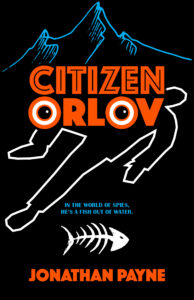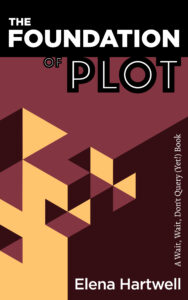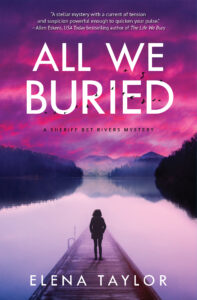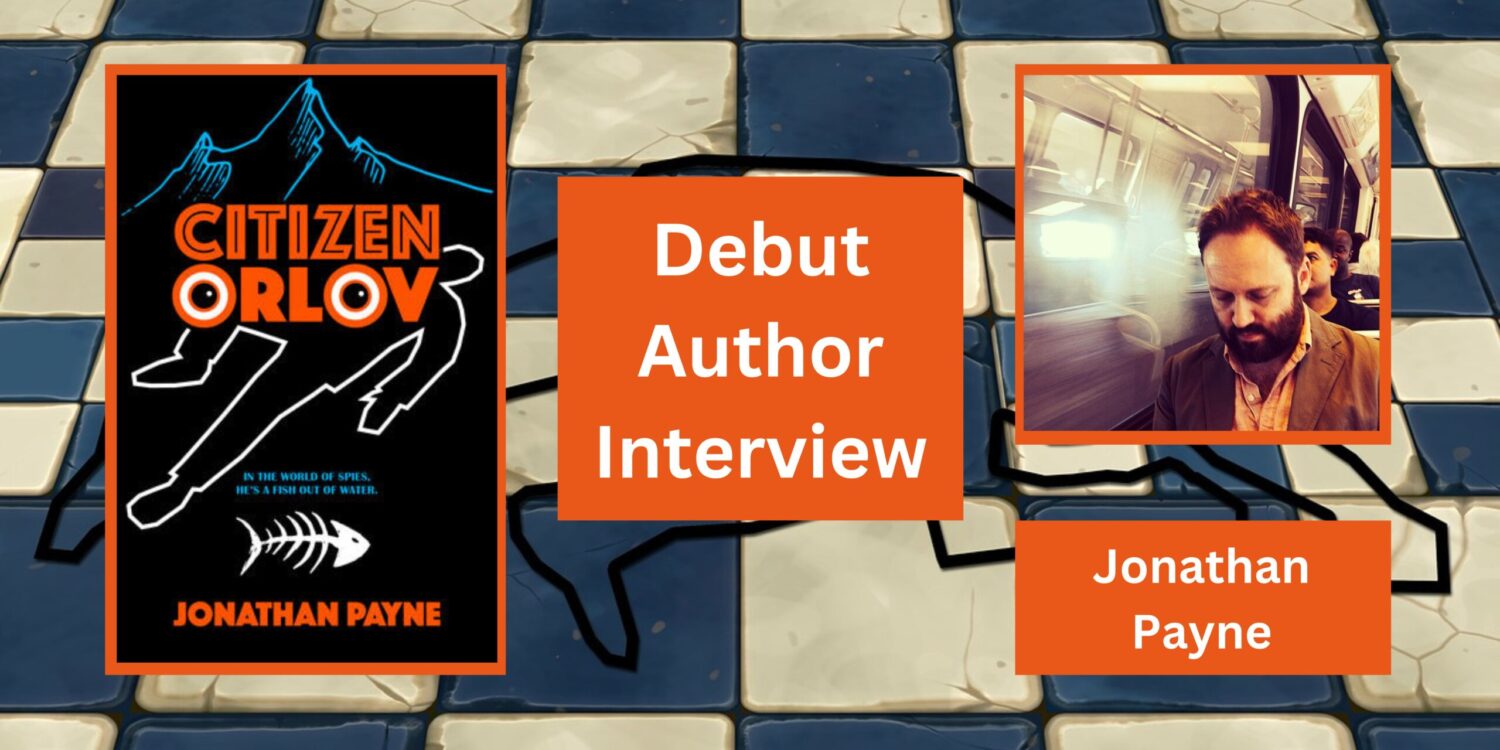Citizen Orlov, a different kind of Spy Thriller by Jonathan Payne
Author Interview + Book & Author Info + Author Pet Corner!
Don’t miss any debut author interviews. Click the link here.

Not every fishmonger can be a secret agent.
Journey to an unnamed mountainous country in central Europe at the end of the Great War. Enter Citizen Orlov, a simple fishmonger and an honest, upright citizen, who stumbles into the Ministry of Security, and consequently a hidden world of espionage and secrecy. His first assignment? To safeguard the King when he visits the scenic town of Kufzig.
But Orlov soon discovers that his ministry handler, the alluring but-couldn’t-possibly-be-a-femme-fatale Agent Zelle, is planning not to protect the King but to assassinate him.
Caught in a web of plot and counterplot, confusing loyalties, and explosive betrayals, Orlov finds himself on trial for murder. He has an opportunity to clear his name—but with his friends, mother, and fellow citizens’ lives in the balance, freedom comes at a high cost.
To purchase Citizen Orlov, click on any of the following links: Amazon, Barnes & Noble, & Waterstones (UK)
Interview with Jonathan Payne, author of Citizen Orlov
Citizen Orlov is “an absurdist take on the spy thriller,” how did you come to write this novel as your debut?
I’m a huge fan of the spy thriller. I inhale the classics like Fleming, le Carre, Forsyth, and so on. Of the contemporary espionage writers, my favorite is probably Daniel Silva. So, that’s the context in which I approach my work. The other piece of context is that I used to work for the British government in a national security role. I was never a spy, to be clear, but I worked on crime, immigration and terrorism, and spent some time in Afghanistan, so inevitably I bring all that to my writing in one way or another.
This particular novel began life as a dream. Early in the pandemic, I caught COVID-19 and had some very odd, vivid fever dreams. In one of these dreams, I was back in my government days and sent on assignment to a foreign country. Somehow, I arrived there without knowing where I was. (Anything is possible in dreams, of course.) Immediately on arrival, someone started shooting at me, which seemed rather unfair. I remember the sense of indignation I had – still in the dream – that I was only following orders. Who was shooting at me and why? The next morning, I wrote down the dream, and it formed the kernel of the novel.
Tell us about Citizen Orlov, protagonist of your debut novel:
Orlov is a fishmonger. A down-to-earth, honest, working-class guy who sells fish in the market square in the unnamed capital city of the unnamed country in which the novel is set. He hears a telephone ringing through the open window of a government office and – being an upright sort of fellow – decides to answer it. That begins a whirlwind sequence of events in which he becomes involved in a covert plot to assassinate the king. Being a regular guy, Orlov has no clue what’s going on and somehow finds himself on trial for murder.
So, the novel is a spy thriller with a non-spy protagonist. The fun for the reader (I hope) is following Orlov as he tries to work out what’s going on and why.
Describe your road to publication for Citizen Orlov?
Initially, I wrote CITIZEN ORLOV as a novella, but extended it to novel length after being encouraged to do so by my writers’ group. I then ran it past several beta readers before beginning to pitch agents. But I got no feedback at all from agents, either good or bad. In fact, I don’t know for sure whether any of the agents I pitched actually read a word of my writing. I gave it a few months and then moved on to plan B, small presses. I got an offer almost immediately, from CamCat, a small press in Nashville, TN. They have a terrific submission process which is much more onerous and time-consuming than the norm. I loved it, because I felt like at least here’s a chance of someone reading my work (not just my cover letter). From the point of accepting their offer, it’s been just over a year for editing, printing and marketing before arriving at publication day.
How did working on national security issues for the British government inform Citizen Orlov?
That’s a great question. I think my years as a civil servant have given me a love for fiction focused on faceless bureaucracies. I’m fascinated by stories about man versus machine.
Obvious examples are THE DOUBLE by Dostoyevsky and THE TRIAL by Kafka. Approaching this novel, I wanted to bring a sense of those stories to my attempt to write a spy thriller. I thought it would be an interesting challenge to ask how the likes of Dostoyevsky or Kafka would have written espionage, if they had been introduced to spy tropes as we understand them today.
What can we find you doing when you aren’t writing absurdist thrillers?
Until recently, the answer was: playing guitar and spending time in the boxing gym.
Unfortunately, both are on hiatus because I had an accident and tore some tendons in my left hand, which required surgery. I’m still doing physio at the moment and hoping to get back to normal soon.
What are you working on now?
Currently, I’m writing the sequel to CITIZEN ORLOV. I’m also working on a novella which is a retelling of the classic Russian story THE OVERCOAT by Nikolai Gogol. The original is about a civil servant in St Petersburg in the 19th century. I move the action to London in the interwar period.
Words of Wisdom for Aspiring Writers:
A few years ago at the National Book Festival in Washington, DC, I listened to Justin Cronin, author of THE PASSAGE. He gave the best advice I’ve heard for new writers: make your work different. Find ways to make your writing stand out from the crowd. That will mean different things to different people. For me, it meant finding a unique voice. I wanted to find a voice that distilled my influences but which was uniquely mine. Readers can judge whether I’ve achieved that.
Great advice! Wishing you success with your writing and recovery from surgery.
Author Pet Corner!

Here’s a photo of my writing companion, Maeby.
She’s named after the daughter in Arrested Development.
Maeby gets upset very quickly if I spend too long at my desk, and she demonstrates this by getting involved, which usually means standing on the keyboard.
Jonathan Payne, author of Citizen Orlov
Jonathan Payne is a British-American writer based outside Washington, D.C. He holds a Master of Arts degree in Novel Writing from Middlesex University, London.
His short fiction has been featured at the North London Story Festival and in magazines including Turnpike, Twist in Time and Fiction Kitchen Berlin.
Before moving to the United States, he worked for the British government on matters of national security. When not writing or reading, he can be found in the boxing gym.
To learn more about Jonathan Payne, click on any of the following links: Website, Twitter, Goodreads, Instagram,
Elena Taylor/Elena Hartwell

 All We Buried, available now in print, e-book, and audio.
All We Buried, available now in print, e-book, and audio.
Silver Falchion Award Finalist, Best Investigator
Foreword INDIE Award Finalist, Best Mystery
The Foundation of Plot, a Wait, Wait, Don’t Query (Yet!) guidebook. Amazon #1 bestseller
Header image by Geralt on Pixabay



